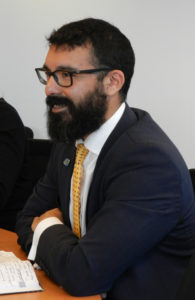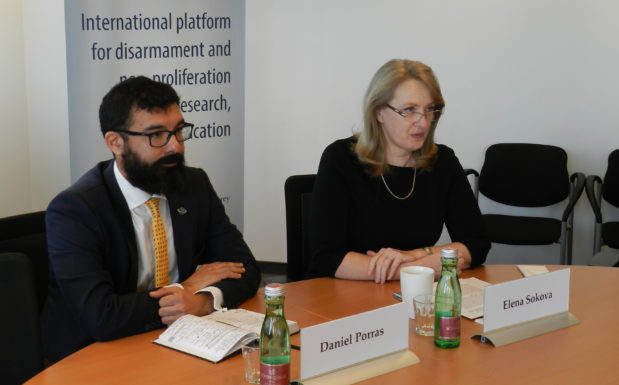
Safety and security in outer space is becoming more important to the international community. On 3 December 2019, the VCDNP in collaboration with UNIDIR held a seminar with UNIDIR Space Security Fellow Daniel Porras to discuss issues concerning establishing rules of behavior in space. The event was moderated by VCDNP Executive Director Elena Sokova.

Mr. Porras began his remarks by articulating the difference between safety and security in outer space: the former covers incidental occurrences such as accidental collisions, and the latter coverts intentional acts. Because objects in orbit travel at very high speeds, collisions are incredibly damaging. Increasing volumes of space debris present a particular safety hazard to satellites since a collision could cause a cascade wherein debris keeps colliding with space objects increase the likelihood of further collisions, also known as the “Kessler syndrome”. Security issues can impact safety issues in that the destruction of satellites can create debris that endangers other objects in orbit, including manned spacecraft.
The expert then discussed four main trends related to safety and security of outer space. Outer space is becoming more critical for everyday life. We rely on satellites for communication and information, and the space economy continues to grow. Secondly, the military applications for space-based technology continue to expand, including GPS, communications and intelligence gathering. Nations are developing counter‑satellite capabilities that can disrupt or destroy satellites. Thirdly, there is a concern that nations may deploy conventional weapons in space to attack terrestrial targets. The single meaningful legal instrument governing activity in space, the Outer Space Treaty of 1967, only outlaws the placing of weapons of mass destruction. Another trend is new policies of a number of states that put a greater emphasis on defense in space. They include creation of new military units and development of technologies that allow states to conduct warfare in space, which is therefore considered a domain for military operations.
Mr. Porras emphasized that these developments do not take place in a vacuum, but rather are influenced by political competition on Earth. He lamented that such competition had made it extremely difficult to create any binding instruments that govern activity in space, whereas the Outer Space Treaty has limited scope and is silent on the use and deployment of conventional weapons in space. Despite attempts by the international community to put some kind of regulation on weapons in space, political considerations and difficulty in defining what counts as a weapon have prevented meaningful discussion or action.
Mr. Porras further suggested that the Vienna and Geneva communities can work together to find solutions that can address both safety and security and offered two ideas. First, while total prohibition of anti-satellite tests is currently considered as not feasible, countries could at least agree on guidelines for such tests. They would help limit the safety hazard caused by space debris produced by a test. The expert described a safety model based on “no debris, low debris, and notification” approach to limit destructive testing. If a state determines that it must conduct a destructive test, it should ensure such testing takes place in lower altitudes to increase the likelihood of debris falling to earth instead of remaining in orbit, as well as notify other states and international organizations about its plans to conduct a test.
Mr. Porras also suggested establishing space traffic management. Co-orbital drones and satellites already pose both security and safety hazards, thus there is an avenue for agreement on measures such as safety zones around satellites or traffic rules.
In his concluding remarks, Mr. Porras stressed the need for including industry, space beneficiaries and stakeholders in discussions on safety and security in space. Private companies are increasingly interested in outer space, already operate numerous satellites and have a great capacity to assist, for example, in verification regimes. States that benefit from satellites but do not have their own ones also need a solid space safety regime as accidents in space may have considerable impact on them too.
Following Mr. Porras’s remarks there was a question and answer period and attendees raised issues covering the dangers of cyber-attacks on satellites and possible avenues of cooperation in space. Attendees additionally highlighted the need for greater diversity in discussions on space safety and security, to include other perspectives such as gender, geographic and social-economic backgrounds that are often not included.
